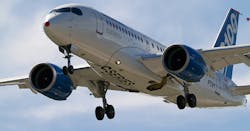US Slaps Duties on Bombardier's C Series Jet in Win for Boeing
The U.S. imposed duties on Bombardier Inc.’s marquee jetliner after Boeing Co. complained that the Canadian company received unfair government help.
Exporters of 100- to 150-seat Canadian aircraft received subsidies worth almost 220%, the Commerce Department said Tuesday in Washington. The U.S. will begin collecting preliminary duties to offset the public assistance, a move that would potentially upend Bombardier’s planned deliveries of its C Series jets to Delta Air Lines Inc. next year.
The aerospace spat is roiling trade relations just as the U.S. tries to renegotiate the North American Free Trade Agreement with Canada and Mexico. “Even our closest allies must play by the rules,” U.S. Commerce Secretary Wilbur Ross said in announcing the decision. Canada “strongly disagrees” with the U.S. probes into its aircraft, Foreign Affairs Minister Chrystia Freeland said in a statement.
“This is clearly aimed at eliminating Bombardier’s C Series aircraft from the U.S. market,” said Freeland, who is dining with U.S. Trade Representative Robert Lighthizer in Ottawa on Tuesday during the third round of NAFTA talks.
The trade penalties could be reversed by the U.S. International Trade Commission if the trade tribunal determines that Boeing wasn’t injured by Bombardier’s jet program. That decision is expected to be made next year, when the Canadian manufacturer is scheduled to deliver the first C Series planes to Delta. Bombardier spent $6 billion to develop the single-aisle aircraft.
Prime Minister Justin Trudeau has said the Canadian government won’t buy Boeing military jets unless the company drops its case against Bombardier.
'Absurd' Magnitude
The Montreal-based manufacturer said Boeing was “seeking to use a skewed process to stifle competition and prevent U.S. airlines and their passengers from benefiting from the C Series.” The aircraft entered commercial service last year in Europe.
“The magnitude of the proposed duty is absurd and divorced from the reality about the financing of multibillion-dollar aircraft programs,” Bombardier said in a statement.
Boeing has accused Bombardier of selling its biggest jet in the U.S. at less than fair value, while benefiting from unfair government subsidies in Canada. The U.S. planemaker has argued that the C Series wouldn’t exist without the assistance, noting that the company received money from the Canadian and Quebec governments to develop the plane and further aid from both in recent years to shore up the company’s finances.
“The U.S. Department of Commerce today affirmed that Bombardier has taken massive illegal subsidies in violation of existing trade law,” Boeing said in an emailed statement. The process is part of “the longstanding, transparent course for examining and addressing situations where products are ‘dumped’ into the United States at below-cost prices for the purposes of gaining market share.”
Commerce is expected to decide by Oct. 4 whether to also impose anti-dumping duties on the C Series. On that matter, Boeing is seeking duties of about 80%.
Delta Preparations
Delta noted the decision is “preliminary” and said the real ruling will come early next year, when the International Trade Commission makes a final determination of whether any U.S. manufacturer will be harmed by imports of the plane. In June, the ITC made a preliminary ruling that Boeing’s commercial jet business may have been harmed by Bombardier. Delta agreed to buy at least 75 of the CS100 planes, the smaller C Series variant, last year.
“We are confident the USITC will conclude that no U.S. manufacturer is at risk because neither Boeing nor any other U.S. manufacturer makes any 100-110 seat aircraft that competes with the CS100,” the Atlanta-based airline said in a statement.
Delta has been preparing to take delivery of the CS100s in the spring, and was expected to allow pilots to bid on assignments to fly the plane in coming months. Those and other preparations will continue, Delta spokesman Morgan Durrant said.
“We believe the key area of concern will be what Delta does with its order following the final ruling if in fact it is ruled that Boeing was damaged and the duty upheld,” Walter Spracklin, an analyst at RBC Capital Markets, said in a note to clients. “Moreover, the impact on other U.S.-based airlines will also be in question under such a ruling.”
By Andrew Mayeda and Frederic Tomesco
About the Author
Bloomberg
Licensed content from Bloomberg, copyright 2016.
